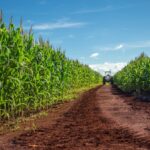Starting a farm in South Africa can be a rewarding venture, but it requires careful planning, dedication, and a solid understanding of agricultural practices. Whether you’re looking to start a small-scale farm or a larger commercial operation, here are some key considerations to guide you through the process.
1. Research and Planning
Before diving into farming, thorough research is essential. South Africa’s diverse climate and terrain offer a wide variety of farming opportunities, from crop farming to livestock production, each requiring different resources and expertise.
- Market Demand: Research the market to understand which products are in demand. Whether you are interested in growing vegetables, fruit, or raising livestock, knowing your target market will help you decide what to produce.
- Soil and Climate: Understand the soil type and climate in your area. South Africa has different farming zones, so choosing the right crops or livestock suited to the local environment is crucial.
- Farm Layout: Plan the layout of your farm, considering factors such as irrigation, drainage, access roads, and building placements for housing livestock or storing equipment.
2. Secure Funding and Resources
Starting a farm often requires significant financial investment. You’ll need funds for land, equipment, seeds or animals, and operational costs until your farm becomes profitable.
- Government Grants and Loans: Look into agricultural grants and funding options available from government bodies or development organizations. There are also specialized loans for farmers, especially for emerging farmers.
- Private Investors: If government funding is insufficient, you may consider seeking private investors or joining agricultural cooperatives that can provide financial support and resources.
- Equipment and Supplies: Depending on the scale of your operation, you may need to purchase farming equipment such as tractors, plows, irrigation systems, and livestock feed. Make sure to source reliable and cost-effective suppliers.
3. Legal Considerations
There are various legal requirements when starting a farm in South Africa. Understanding these is essential for ensuring compliance and protecting your investment.
- Land Ownership: Ensure that the land you plan to farm on is legally acquired, either through purchase or lease. Be aware of land reform policies that may affect land ownership.
- Licenses and Permits: Certain agricultural activities, such as the sale of livestock or processed food products, may require specific licenses or permits. Consult the Department of Agriculture, Forestry and Fisheries (DAFF) for guidance.
- Taxation: South African farmers are subject to tax laws. Consider consulting with a financial advisor to understand the tax implications of your farm operation and how to manage taxes efficiently.
4. Choose the Right Farming Method
There are various farming methods you can adopt, depending on your goals and the scale of your operation.
- Traditional vs. Modern Farming: Traditional farming methods are often more labor-intensive but may be more sustainable in certain areas. Modern farming techniques use advanced technology, such as precision farming, to maximize yields and efficiency.
- Organic Farming: With growing demand for organic produce, starting an organic farm can be a profitable choice, although it requires meeting specific certification standards and adapting farming practices.
- Sustainable Practices: Sustainability is key to the long-term success of a farm. Consider practices that promote soil health, water conservation, and energy efficiency to reduce costs and environmental impact.
5. Build a Strong Network
Networking is vital in farming. South African farmers often work in close-knit communities, sharing resources, knowledge, and expertise.
- Join Agricultural Associations: There are numerous agricultural organizations and cooperatives in South Africa, such as the South African Agricultural Union (SAAU), that can provide support, training, and resources for new farmers.
- Farmers’ Markets: Selling directly at farmers’ markets can help you build relationships with local consumers and expand your customer base.
- Training and Education: Take advantage of training programs and workshops offered by agricultural colleges, NGOs, and government initiatives to enhance your farming skills and business acumen.
6. Marketing and Distribution
Having a high-quality product is not enough; you must be able to market and distribute it effectively. Developing a marketing plan that targets the right consumers is essential.
- Direct Sales vs. Wholesalers: Decide whether you will sell your products directly to consumers (through farmers’ markets or farm shops) or to wholesalers, distributors, or retailers.
- Branding: Establish a strong brand for your farm to differentiate your products in the market. Consider eco-friendly packaging, labeling, and advertising strategies.
- Online Presence: In today’s digital age, having an online presence can significantly increase your reach. Set up a website or social media accounts to showcase your products and engage with customers.
7. Start Small, Grow Gradually
Farming is a business that requires patience and persistence. Start small and gradually scale up as you gain experience and confidence in your operations. Managing the risks associated with farming, such as fluctuating market prices, weather conditions, and diseases, is crucial for long-term success.
8. Embrace Innovation and Technology
South Africa’s agricultural sector is evolving rapidly, and technological advancements are playing a significant role in improving productivity and profitability.
- Precision Agriculture: Invest in technology that allows you to monitor and manage your farm more efficiently, such as GPS-guided tractors, drones for crop monitoring, and soil sensors.
- Mobile Apps: Several mobile apps are designed specifically for farmers, helping with farm management, crop planning, and market pricing.
Starting a farm in South Africa is an exciting venture that requires careful preparation and hard work. By conducting thorough research, securing adequate funding, and building a strong network, you can establish a successful farm. With the right knowledge, resources, and commitment to sustainable practices, you’ll be well on your way to becoming a successful South African farmer.
Join 'Farmers Mag' WhatsApp Channel
Get the latest Farming news and tips delivered straight to your WhatsApp
CLICK HERE TO JOIN






